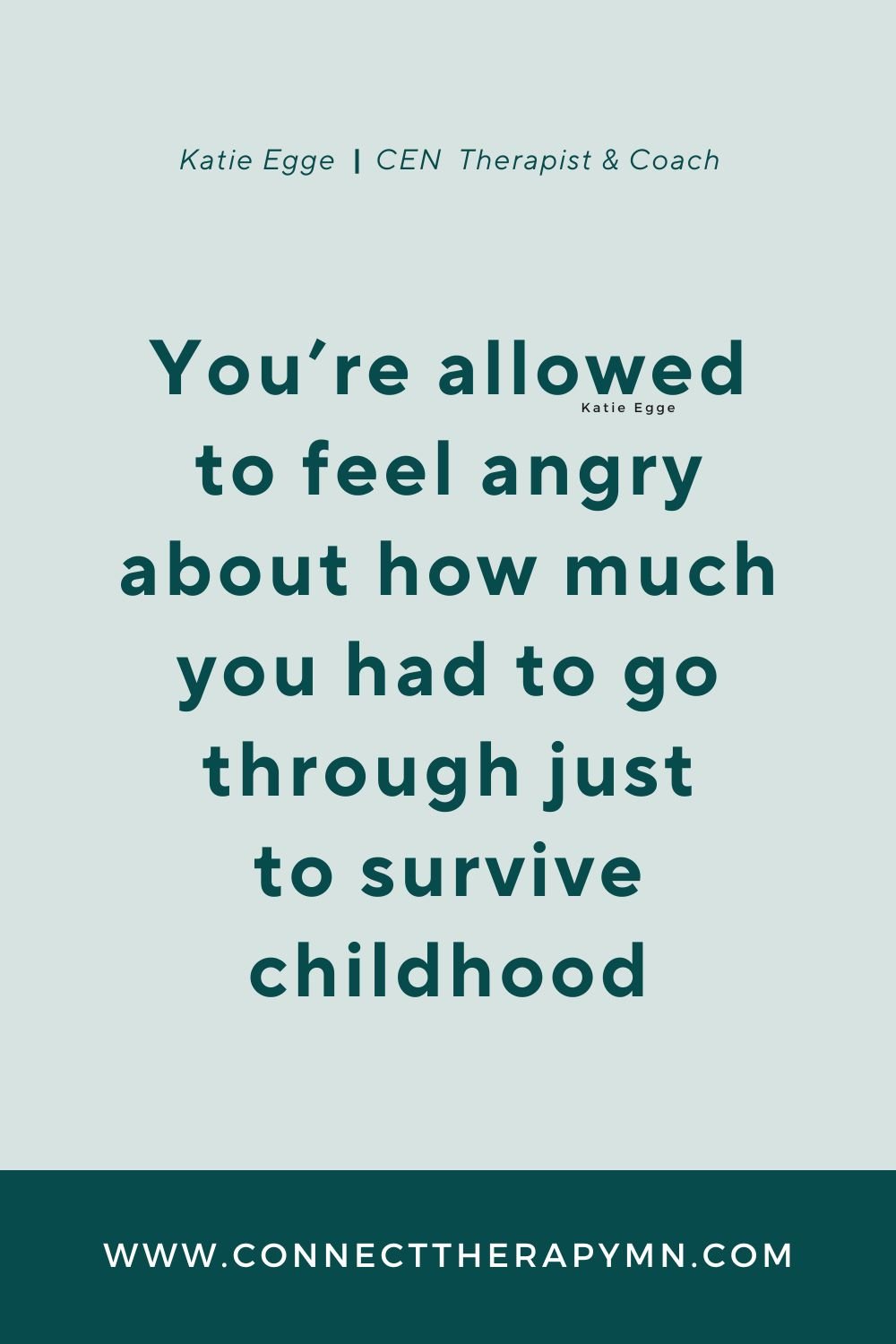You Were Taught Anger = Bad…But What If It’s The Key To Healing From Your Childhood?
This blog covers:
When Anger First Shows Up In Healing
How Childhood Emotional Neglect (CEN) Teaches You To Suppress Anger
Why Emotionally Immature Parents (EIPs) Can’t Handle Anger
Why Anger Feels So Guilty for CEN Survivors
How Unprocessed Anger Affects Adulthood
3 Ways Anger Helps You Heal
When Anger Shows Up In Healing
“I don’t know what to do with this,” he said. “It makes me feel guilty, like I’m being ungrateful. I had a pretty good childhood, and my parents aren’t bad people…but I still feel so angry toward them!”
*David, a new client, recently shared this with me during his session. He had just learned about Childhood Emotional Neglect (CEN) and was starting to connect the dots - not just about what happened in his childhood, but what didn’t happen that should have.
And with this new awareness came something powerful and unexpected: anger.
A deep, unfamiliar kind of anger that had been buried for years because he had spent most of his life suppressing it to stay safe and accepted, never learning how to name it, express it, or even feel it safely.
What stung the most? Realizing how much he missed out on as a child:
Emotional validation and safety
Co-regulation and processing of his experiences
Key relationship skills, like healthy communication, conflict resolution, and boundaries
And even more painful was the sense that he’d lost valuable time and opportunities because of those missing tools. Now, doing the hard work of healing and reparenting himself felt overwhelming…and unfair.
Hence his anger. But instead of feeling empowered by it, he felt scared.
Now, finally allowing himself to feel it, the emotion felt raw, foreign, and overwhelming. This made him even angrier because he had always thought of himself as capable and successful, and yet the emergence of this emotion was shaking his self-confidence.
David’s experience isn’t unique.
In fact, it’s something I often see in adults who great up with CEN. They reach a point in their healing where suppressed emotions - especially anger - start to break through the surface. But because they were never taught how to understand or express anger safely, it feels overwhelming, shameful, or even wrong.
But here’s the truth:
Anger is one of the most important emotions to work with when recovering from emotional neglect—and yet, it’s also the emotion most often misunderstood, feared, and shut down.
Let’s explore why that is—and why allowing yourself to feel anger might be one of the most healing things you can do.
How Childhood Emotional Neglect Teaches You To Suppress Anger
CEN isn’t always about what your parents did—it’s often about what they failed to do. They may have provided meals, clothes, and shelter—but never:
Noticed your feelings
Validated your inner experiences
Helped you work through emotions like sadness, fear, anger, or disappointment
These are all emotional needs. And just like physical needs, they’re essential to human development. (They’re called needs—not wants—for a reason!)
One of the key functions of anger is to alert you when something isn’t OK, such as when your emotional needs are being overlooked or dismissed.
Anger says: “Hey, pay attention. Something here needs to change.”
In other words, anger isn’t the problem—it's what helps you both recognize the problem and:
Speak up for yourself
Ask for what you need
Set boundaries
Advocate for fairness or change
In families with more emotionally mature parents, this kind of anger is met with curiosity and care. A parent might say: “I hear you’re upset. Let’s talk about it.” or “Thanks for letting me know how you feel. Your feelings make sense.”
But in families with more emotionally immature parents (EIPs), anger is often met with fear, discomfort, or outright shutdown.
Why Emotionally Immature Parents Can’t Handle Anger
Emotionally immature parents (EIPs) often lack the skills and self-awareness to respond to your anger in healthy ways. So instead of helping you understand or express it, they might:
Dismiss or minimize your feelings (eg. “You’re overreacting!”, “Stop making a scene!”)
Punish or shame you for feeling upset (eg. “Go to your room!”, “What’s wrong with you?!”, “You’re going to get a spanking when we get home!”)
Require you to stay emotionally “easy” so they feel okay
This often happens because:
They never had their own emotional needs met, so they don’t know how to meet yours
They feel overwhelmed or threatened by big emotions, including their own
They unconsciously rely on you to manage their emotions—by staying small, quiet, or emotionally low-maintenance
Instead of learning that your anger is a signal worth listening to, you learned it wasn’t safe to feel it, and that you’re not lovable or acceptable unless you’re happy.
So you adapted. You suppressed it. You became compliant, people-pleasing, overly independent, or emotionally numb. You were likely praised for being easygoing, low-maintenance, or mature for your age—when really, you had just learned not to have needs or emotions that made anyone else uncomfortable.
But here’s the truth: your anger didn’t disappear. It just went underground.
Why Anger Feels So Guilty for CEN Survivors
If you grew up in a home where anger was unsafe—either punished or met with withdrawal—it makes sense that now, even feeling angry triggers guilt.
You might think:
“I’m overreacting.”
“They did their best.”
“I should be grateful—it wasn’t that bad.”
“I shouldn’t feel this way.”
This is especially true if you used to describe your childhood as relatively good or normal!
Guilt often shows up because it is another powerful way to keep your anger at bay so that you don’t act on it and increase risk of rejection from your family.
Guilt isn’t a sign that your anger is wrong. It’s a sign that your anger was never allowed to exist.
How Unprocessed Anger Affects Adulthood
Unfelt anger doesn’t disappear. It transforms into things like:
Chronic people-pleasing
Difficulty setting boundaries
Passive-aggressive behavior
Depression or emotional numbness
Self-blame or shame
Explosive outbursts that feel out of character and context
3 Ways Anger Helps You Heal
1. Anger Helps You Set Boundaries
When you’ve spent a lifetime ignoring or minimizing your anger, you lose connection with your internal alarm system. As a result, it’s harder to know when you’re being mistreated, taken advantage of, or ignoring your own needs. This can make it harder to recognize when and where a boundary is needed.
But when you allow yourself to feel your anger—without judgment—it becomes a powerful guide to recognize:
What’s not working
What feels unfair
Where your needs are being ignored
When it’s time to speak up or walk away
Anger doesn’t mean you’re bad—it means you’re starting to care about yourself.
2. Anger Is Often a Doorway to Grief
For many survivors of CEN, anger isn’t the final emotion—it’s the gateway.
Underneath the rage or resentment is something much deeper: grief.
Grief for:
The childhood you didn’t get
The support you needed but never received
The lost time lost, the strained relationships, and the identity shaped around being small, quiet, or invisible instead of your true self
This grief can feel heavy—but it’s also a key part of the healing process.
You can’t grieve what you don’t acknowledge.
And anger helps you finally tell the truth about what you went through.
3. Anger Provides Energy
Healing takes energy—a lot of it.
And anger, though often misunderstood, is one of the most energizing emotions we have. It surges through the body, demanding attention and movement. That’s exactly why anger can be such a powerful ally in the healing process.
When channeled in healthy ways, it gives you the fuel to do the hard work to set boundaries, make changes, and reclaim the parts of yourself that were once silenced.
How Do I Cope With My Anger When I Never Learned How?
You’re not alone; many CEN survivors struggle to cope with anger because they simply never learned how. Instead, they learned to associate it with chaos, fear, or punishment.
Learning to cope with anger involves:
Naming and validating your anger versus judging or questioning it
Getting curious about what it’s trying to tell you
Rewiring your nervous system to gradually increase your tolerance to feel anger in your body
Giving yourself what you have needed all these years when you felt angry
Anger is necessary.
It’s what helps you say, “This isn’t okay,” with confidence and self-respect.
If you’re not used to feeling anger, it’s normal to fear it. But that’s why support matters. Healing doesn’t mean exploding—it means learning to listen to the part of you that’s been silenced the longest.
Feeling angry doesn’t mean you’re stuck. It doesn’t mean you’re ungrateful (or you think your parents are bad people).
It means you’re waking up. You’re recognizing that what happened to you—or what didn’t happen—matters. And that your feelings are valid, even if they make you—or others—uncomfortable.
The more you allow yourself to feel your anger, the more space you make for your truth, your needs, and your healing.
Ready to Heal in a Safe, Supportive Space?
If any part of David’s story feels familiar, you’re not alone. Feeling angry about what you didn’t receive—love, safety, emotional guidance—isn’t a sign that something’s wrong with you. It’s a sign that you’re rebuilding.
Anger, when met with compassion instead of shame, becomes fuel for healing. It helps you set boundaries, name your needs, and reclaim the parts of yourself that were ignored or dismissed.
You deserve a space where that kind of healing is supported—not judged. That’s exactly why I created my Online Childhood Emotional Neglect Support Group. It’s a safe, guided space to process emotions like anger, grief, and guilt with others who get it, plus gain tools to finally heal - and prevent - the cycle of CEN.
Click the button below if this sounds like what you need in your life right now:
“It’s OK to feel angry about everything you had to go through to survive childhood.”
Hi! I’m so glad you’re here!
I’m Katie Egge, a Minnesota-based therapist and coach who’s passionate about providing the support, resources, and tools that people need - but didn’t get growing up - to heal from and prevent Childhood Emotional Neglect.
BOOK A FREE CONSULT with me today to start moving forward in your life with more clarity, confidence, and authenticity.



